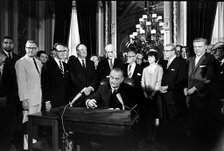79. Land of the Free and Home of the Brave? Are we brave enough for a Rebellion?
One of the litmus tests I have for people I will wholeheartedly support for office, as opposed to those I just prefer, are politicians who make a point of not saying they can do whatever it is they want to do without raising taxes. The beneficiaries of my greatest support are those who leave open the door that a time may arise for a need of additional revenue; revenue enhancement was the euphemism used by President Reagan. Anyone who gives in to the notion that a government serving more and more people can function on less and less money is simply following the current whims of a generation raised in the post-Proposition 13/Ronald Reagan era which presupposes without adequate information that, as the Great Communicator proclaimed on the day he first took office as Commander-In-Chief, "government is not the solution to our problem; government is the problem." Having such a litmus test in these times greatly reduces the number of folks I can wholeheartedly support, as very few politicans will admit to such a belief. But one can always hope. Optimism is a great virtue.
So, is government always the problem? Is there a proper role for government, and is there a proper role for a government which expands as the population it serves expands? For those who believe President Reagan's admonishment of government as the problem, I beg to differ. And to beg to differ requires to further beg that the government operating of reduced funds while serving a larger populace is not a better government. A government operating on the idea that "that government which governs best governs least," given us by Thomas Paine, doesn't necessarily mean such a government should be reduced to as little spending as possible. Paine's thought differs from the former president in that Paine does not call the government a problem, but rather suggests that it work to get its job done more efficiently. But Paine also gave us a lesser known quote on the same subject, "Those who want to reap the benefits of this great nation must bear the fatigue of supporting it."
Support of the government from those reaping benefits can only happen through appropriate taxation. That is a strong statement such that taxes are not the overpowering evils that Grover Norquist, Harold Jarvis, Paul Gann, and others make them out to be. I understand that for many of these folks, one of their concerns about an overabundant treasury is that some of the money will be ill-spent or even not spent at all and rather will end up in the pockets of those for whom it was not intended (often those empowered with the direction of particular programs). I do not fault them for such a supposition as we all know these things have happened and are likely to again. But such misdeeds by agents of the government does not remove the burden of the government to promote, as the Preamble of the United States Constituiton so states, the "general welfare of the people," as well as to "insure doemstic tranquility." These are not suggestions; these are absolute directives from the so-called Rule Book of our Republic.
What then qualifies as ensuring domestic tranquility and promoting the general welfare of the people? Is it the interstate highway system which connects all of us to each other geophysically? Is it the women and men who serve in the armed forces of our Republic, defending our freedoms at home and abroad? Is it the idea that Americans deserve clean water to drink and clean air to breathe? Is it a National Parks System providing for needed respites from everyday life? Is it a government of laws which helps businesses to prosper and thus help find good and enjoyable employment for our citizens? It is all of these things, of course. But it is also the idea that all of us (a plurality of beings) have responsibility for the country as a whole (a singular entity); "E Pluribus Unum," the national motto which in Latin reads, "Out of many, one."
This national motto was adopted in 1776 and again in 1782. It served as the official primary motto of the country until 1956 when "In God We Trust" superceded it in the United States Code. It remains an offical motto, just not the official motto. We have two other mottoes, "Annuit Coeptis" and "Novus Ordo Sedorum," both also adopted in 1782 with "E Pluribus Unum." They are translated, respectively, as "The beginning is approved" and "A New Order of the Ages." The "E Pluribus Unum" motto pointed to the melting pot of the thirteen original colonies and to make such a point has a total of thirteen letter making one statement. In those earliest of days most of the colonists were all white northern Europeans. But they came from different faiths, different cultures, both rural and urban, and more than a few criminals. In this new place, they were one, "Americans." That the states joined together in federation indicated they were willing to live under a federal system of laws, laws to be passed by a Congress with two types of representation, the House being elected with respect to the population of a district against the whole of the entire country thereby acknowledging that each person was of equal stature vis-a-vis each other, and a Senate elected with respect to the number of states in the whole acknowledging that each state, from the smallest to the greatest, was also of an equal stature vis-a-vis each other.
Do we as a nation still subscribe to that idea? I've always found it interesting that in English, the unoffical but predominant language of our country, the abbreviation for our country is [sometimes written] as US. In other languages, the abbreviation would be EE-UU, for Etats-Unis or Estados Unidos. I find "US" circumstantially auspicious. We all know the word "us" to mean a group of more than one which includes ourself. We, the people. It should be hoped that the "US" would consider all its people a part of the "us" that makes "US." But we don't. We have divisions as all large groups of people naturally do. We create divisions between men and women in the workplace, between young and old in how we care for people, between rich and poor in housing conditions, between the employed and those who aren't in healthcare, and between any numbers of peoples by the promotion of one religious set of beliefs over another in the form of federally supportive "faith based initiatives." We also allow states to pass laws which contravene the Constitutional guarantee in the full faith and credit clause. And while the United States government has no official language, 26 of the 50 states (as well as the US Virgin Islands) have adopted English as their sole offical language. Hawaii officially recognized two languages, English and Hawaiian, while several states have both English and Spanish as de facto languages, although not official ones. The Commonwealth of Puerto Rico, a territory of the United States, officially recognizes both Spanish and English.
The point here is that we are losing the "us" part of the "US." We are becoming a nation wherein each person is sovereign unto themself. We are moving from "E Pluribus Unum" to "E Unum Pluribus." But, there is hope. Hope always springs eternal. Our founding fathers provided for the potential overthrow of a majority of the congress every four years. It is amazing to think that a group of people, voters, can by their participation in the government change the House of Representatives and one-third of the Senate every other November. We did it last year. By every fourth November, they can additionally change a second-third of the Senate and the Commander-In-Chief. Such a change would, over time, also change the third branch of government as deaths and retirements take their toll on the Supreme Court. Where other governments of the world sometimes require actual revolutions and blood-in-the-streets overthrows, ours is designed to have one built in every four to six years. We don't always have one every four to six years, but the potential is there. We did have one in 2006. Before that we had one (for the Republicans) in 1994. They do happen and they must continue to happen if our government is to evolve with the population it serves. We (that is "us") began such a revolution last November. It hasn't fully produced the changes many of us sought because the revolution is incomplete. It requires a second round, a round which will be held in 2008. Those of us who believe our government needs excessive change, starting with the removal of our troops from Iraq and encompassing a return to the rights and priveleges of the people as outlined in the United States Constitution, must be vigilant in seeing that the second round occurs to our satisfaction.
Last week I attended a meeting where Congressman Yarmuth orated on how the new Congress is attempting to address War in Iraq and the ending of America's occupation thereof. He urged patience. The Congress has sent its war-spending package to a committee to reconcile the House and Senate differences, whereupon once reconciled, the bill will be sent to the president, who has already promised a veto. Eventually a spending bill will be passed without the requisite removal of the troops because we simply do not have the votes to force the president to do that. What we do have the votes for are future appropriations. Sooner or later, a question of the Congress' Constitutional authority to conduct a war by virtue of it powers of appropriation will rise. The former, the conduct of a war, it lacks; the latter, the provision of money to conduct such a war, it has. This will be a summer of both education and conflict in the District of Columbia. It will be a very good test of the underpinning of our democratic republican form of government. We will survive it as we have survived other Constitutional crises, dating back to the earliest of our history.
But it will all be made easier by additional participation in the most basic of our country's built-in abilities of self-governance, the election of its officers to the House and Senate and the Presidency. From time to time we've been tempted to believe that society has become too complex to be managed by self-rule, that government by an elite group is superior to government for, by, and of the people. That sentence is also from Reagan's first inaugural speech over twenty-six years ago. Right now the elite group controlling the government, as opposed to the government "of, by, and for the people," are those who vote every time there is an opportunity. And while their collective minds have moved to the left, there is (as my elementary schools teachers invariably reported on my report cards) "room for additional improvement."
I urge you to be involved in elections. Seek out those who pass your own individual litmus tests. We all have them to some degree. And be prepared not just for this election in 2007, but the federal one coming up in 2008. Always be vigilant. Every federal election is a potential overthrow of the government. Thomas Jefferson, in a letter to James Madison dated January 30, 1787, before either of them became president, suggested,
I hold it that a little rebellion now and then is a good thing, and as necessary in the political world as storms in the physical. Unsuccessful rebellions, indeed, generally establish the encroachments on the rights of the people which have produced them. An observation of this truth should render honest republican governors so mild in their punishment of rebellions as not to discourage them too much. It is a medicine necessary for the sound health of government.
We've all heard or read this quote before, but rarely do we hear the whole thing. The last line on the sound health of government is our charge. To keep the government healthy, a little rebellion in the form of voting some of the "ins" out is a good thing. (They'll have an "R" behind their names). Be sure to do your part.



























No comments:
Post a Comment